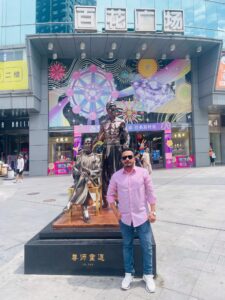- What inspired you to pursue a career in business, and how did your time at the University of Dhaka shape your interests and goals?
My interest in business was sparked by my family’s entrepreneurial background. Growing up, I saw firsthand the impact that a well-run business can have on people’s lives. During my time at the University of Dhaka, I was exposed to various aspects of business through my coursework, internships, and extracurricular activities. These experiences not only deepened my understanding of business principles but also instilled in me a passion for marketing and leadership. The university’s emphasis on practical learning and community engagement helped me develop a strong foundation in business and prepared me for the challenges of the corporate world.
2. Can you share a memorable experience or lesson from your university days that has stuck with you throughout your career?
One experience that stands out was when I was part of a team that organized a marketing competition on campus. We spent weeks planning and executing the event, which was a huge success. However, what struck me most was the importance of teamwork, communication, and adaptability. We faced several last-minute challenges, but our team’s ability to work together and think on our feet ensured that the event went smoothly. This experience taught me the value of collaboration, creative problem-solving, and staying calm under pressure – essential skills that I continue to apply in my professional life.
3. How did your involvement in university life, such as lecturing at the university coaching center, influence your development as a leader and communicator?
My experience as a lecturer at the university coaching center was instrumental in shaping my leadership and communication skills. It forced me to articulate complex concepts in a clear and concise manner, which helped me develop my public speaking skills. Additionally, I learned to create engaging lesson plans, manage a classroom, and provide constructive feedback – all of which have been invaluable in my roles as a CEO and team leader. The experience also taught me the importance of empathy and understanding in effective communication, which has enabled me to build strong relationships with my team members, customers, and stakeholders.
4. What have been some of the most significant challenges you’ve faced as CEO of Shoishob Bangladesh, and how have you overcome them?
One of the biggest challenges I faced was navigating the company through a period of rapid growth while maintaining our core values and culture. To address this, I prioritized building a strong leadership team and empowering them to make decisions. I also focused on establishing clear communication channels, setting measurable goals, and fostering a culture of innovation and continuous learning. By doing so, we were able to scale efficiently while staying true to our mission and values.

5. How has your leadership style evolved over time, and what skills have you developed to effectively manage teams and drive growth?
As I’ve grown as a leader, I’ve become more aware of the importance of emotional intelligence, empathy, and self-awareness. I’ve developed my ability to listen actively, provide constructive feedback, and create a safe and inclusive work environment. I’ve also honed my strategic thinking skills, which enables me to make informed decisions that drive growth and align with our company’s vision. Furthermore, I’ve learned to prioritize my own development, seeking mentorship and staying up-to-date with industry trends to ensure that I’m equipped to lead the organization effectively.

6. What role do you think innovation and adaptability play in the success of a company, and how do you encourage these qualities within your organization?
Innovation and adaptability are essential for any company to stay relevant and competitive. At Shoishob Bangladesh, we encourage a culture of experimentation and calculated risk-taking. We provide resources and support for our team members to explore new ideas and approaches, and we recognize and reward innovative thinking. Additionally, we prioritize continuous learning and development, offering training programs and workshops that help our team members stay ahead of the curve. By fostering a culture of innovation and adaptability, we’re able to stay agile and responsive to changing market conditions and customer needs.
7. How do you prioritize your own professional development, and what skills do you believe are essential for aspiring CEOs to focus on?
I prioritize my own development by setting aside dedicated time for learning and self-reflection. I read industry publications, attend conferences, and seek mentorship from experienced leaders. I believe that aspiring CEOs should focus on developing strong communication and interpersonal skills, as well as strategic thinking and problem-solving abilities. Additionally, they should prioritize building a strong network of peers and mentors, staying adaptable and open to new ideas, and cultivating a growth mindset.
 8. What advice would you give to university students looking to transition into the workforce, particularly in the retail or business sectors?
8. What advice would you give to university students looking to transition into the workforce, particularly in the retail or business sectors?
My advice would be to gain as much practical experience as possible through internships, volunteer work.







